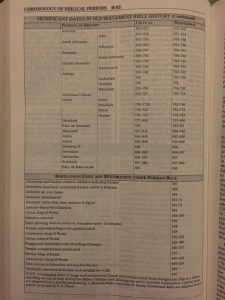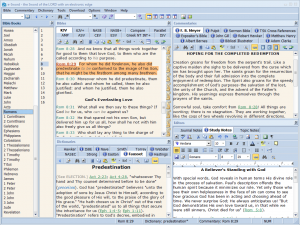Welcome to Day 1449 of our Wisdom-Trek, and thank you for joining me.
This is Guthrie Chamberlain, Your Guide to Wisdom
Journal Articles and Cross-References for Bible Study – Meditation Monday
Wisdom – the final frontier to true knowledge. Welcome to Wisdom-Trek! Where our mission is to create a legacy of wisdom, to seek out discernment and insights, to boldly grow where few have chosen to grow before. Hello, my friend, I am Guthrie Chamberlain, your captain on our journey to increase Wisdom and Create a Living Legacy. Thank you for joining us today as we explore wisdom on our 2nd millennium of podcasts. This is Day 1449 of our Trek, and it is time for Meditation Monday. Taking time to relax, refocus, and reprioritize our lives is crucial in order to create a living legacy. For you, it may just be time alone for quiet reflection. You may utilize structured meditation practices. In my life, Meditation includes reading and reflecting on God’s Word and in prayer. It is a time to renew my mind, refocus on what is most important, and making sure that I am nurturing my soul, mind, and body. As you come along with me on our trek each Meditation Monday, it is my hope and prayer that you, too, will experience a time for reflection and renewing of your mind.
We are continuing our series this week on Meditation Monday as we focus on Mastering Bible Study through a series of brief insights from Hebrew Scholar, Dr. Michael S. Heiser. Our first few insights will focus on study habits to build a strong foundation. Today let us meditate on:
Journal Articles and Cross-References for Bible Study
· Insight Nine: Read Journal Articles
 When people see the word “journal,” they think of a diary or travelogue. Those aren’t what I’m talking about in this situation. Instead, think academic research journals. I understand that academic journals make for challenging reading. Scholars write them for scholars and their students (pastors, seminarians, or graduate students). That being said, they are an excellent tool for biblical research. Since they are published a few times every year, they are more up-to-date than commentaries and Bible dictionaries. They are the cutting edge.
When people see the word “journal,” they think of a diary or travelogue. Those aren’t what I’m talking about in this situation. Instead, think academic research journals. I understand that academic journals make for challenging reading. Scholars write them for scholars and their students (pastors, seminarians, or graduate students). That being said, they are an excellent tool for biblical research. Since they are published a few times every year, they are more up-to-date than commentaries and Bible dictionaries. They are the cutting edge.
Academic journals are like magazines. They usually have between five and ten articles covering a hundred or so pages. They are not magazines. There are crucial differences.
Journal content is peer-reviewed. Articles that appear in a magazine like TIME are not submitted to a panel of field experts. They are written by journalists who may or may not have academic exposure to the field of their article. For example, there is a clear difference in tone and quality between an article on Alzheimer’s that appears in the Journal of the American Medical Society (JAMA) and TIME magazine. An article in TIME will be written for nonspecialists and have a strictly imposed word count. It’s a diluted summary of the topic. You get the basics. However, an article in a journal may run thirty pages, use technical vocabulary, and will have undergone peer review. It’s scientific research discussed by experts. You get all the hard data.
However, an article in a journal may run thirty pages, use technical vocabulary, and will have undergone peer review. It’s scientific research discussed by experts. You get all the hard data.
You ought to know about scholarly journals in biblical studies and read them from time to time. Major news magazines seem to annually produce hit pieces on the historicity of Jesus and the Gospels every Christmas and Easter. What readers get in those articles is the work of a journalist, not a scholar. That journalist might interview a handful of scholars for a half-dozen quotations. Those are sound bites. You’re getting crumbs that a nonexpert with no expert supervision decides you need to read.
As a serious Bible student, you should know that anything you’d ever read in a popular magazine about the Bible is selective in content and guided by an editorial agenda. Academic journals will show you what experts in the field, of all theological persuasions, including those with a high view of the Bible, are actually saying. Read them.
· Insight Ten: Lookup Cross-References
 Any seasoned Bible reader knows what cross-references are: chapter and verse references inserted in your Bible near (or within) the verses you’re actually reading. Print Bibles use several conventions for cross-references. A typical strategy places tiny superscripted numbers or letters next to words that correspond to other verse references located somewhere else on the page, usually the bottom. A fundamental principle in Bible study is letting the Bible interpret itself. Cross-references are an essential gateway to making that happen.
Any seasoned Bible reader knows what cross-references are: chapter and verse references inserted in your Bible near (or within) the verses you’re actually reading. Print Bibles use several conventions for cross-references. A typical strategy places tiny superscripted numbers or letters next to words that correspond to other verse references located somewhere else on the page, usually the bottom. A fundamental principle in Bible study is letting the Bible interpret itself. Cross-references are an essential gateway to making that happen.
The purpose of cross-references is to alert you to other verses in the Bible that say something similar. For example, let’s say we are in Ephesians l, and we come to verse 7: “In him, we have redemption through his blood, the forgiveness of our trespasses, according to the riches of his grace.” The ESV puts superscripted letters next to several words in that verse: in, redemption, through, forgiveness, according. Those letters give me a total of ten cross-references to other verses that reiterate or develop the ideas of Ephesians 1:7.
The more cross-references you can find, the better. Many concepts in Scripture are threaded throughout its pages, not just echoed here and there. When Scripture becomes a commentary on Scripture for you, you re starting to do biblical theology. Ten cross-references may sound like a lot, but it isn’t. The ESV Study Bible lists nearly ten more verses that I could look up in regard to Ephesians 1:7. But you can do a lot better than that.
Ten cross-references may sound like a lot, but it isn’t. The ESV Study Bible lists nearly ten more verses that I could look up in regard to Ephesians 1:7. But you can do a lot better than that.
One of the tools every Bible student should have, in print or digital form, is The Treasury of Scripture Knowledge. The latest edition claims to be “the most complete listing of cross-references available anywhere.” It’s not an idle boast. The entire book is a compilation of cross-references. That’s right—a book full of nothing but lists of verses. No prose. It’s wonderful. It provides nearly forty cross-references for Ephesians 1:7.
The Treasury of Scripture Knowledge is most conveniently used within a Bible software platform. The speed saves you a lot of time. But even in hard copy, this is a must-have tool. There are so many free and paid software programs available today for your computer or phone, there is no excuse to remain ignorant and lacking in your Bible Study.
Study this Book of Instruction continually. Meditate on it day and night so you will be sure to obey everything written in it. Only then will you prosper and succeed in all you do.
That is a wrap for today’s Meditation, next week; we will continue our trek on Meditation Monday as we take time to reflect on what is most important in creating our living legacy. On tomorrow’s trek, we will explore another wisdom quote. This 3-minute wisdom supplement will assist you in becoming healthy, wealthy, and wise each day. Thank you for joining me on this trek called life. Encourage your friends and family to join us and then come along tomorrow for another day of ‘Wisdom-Trek, Creating a Legacy.’  If you would like to listen to any of the past 1448 daily treks or read the daily Journal, they are available at Wisdom-Trek.com. I encourage you to subscribe to Wisdom-Trek on your favorite podcast player so that each day will be downloaded to you automatically.
If you would like to listen to any of the past 1448 daily treks or read the daily Journal, they are available at Wisdom-Trek.com. I encourage you to subscribe to Wisdom-Trek on your favorite podcast player so that each day will be downloaded to you automatically.
Thank you for allowing me to be your guide, mentor, and most importantly, I am your friend as I serve you through this Wisdom-Trek podcast and Journal.
As we take this Trek of life together, let us always:
- Live Abundantly (Fully)
- Love Unconditionally
- Listen Intentionally
- Learn Continuously
- Lend to others Generously
- Lead with Integrity
- Leave a Living Legacy Each Day
I am Guthrie Chamberlain….reminding you to ’Keep Moving Forward,’ ‘Enjoy your Journey,’ and ‘Create a Great Day…Everyday’! See you tomorrow!
Leave a Reply